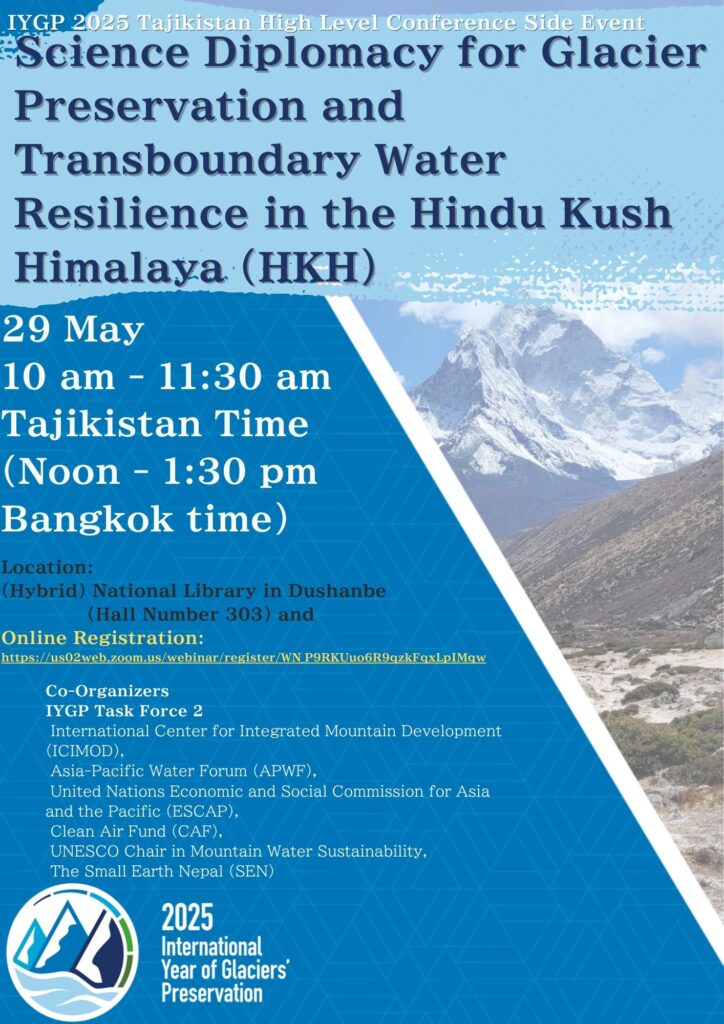
IYGP 2025 Tajikistan High Level Conference Side Event
Science Diplomacy for Glacier Preservation and Transboundary Water Resilience in the Hindu Kush Himalaya (HKH)
29 May, 2025 10 am-11:30 am Tajikistan Time (14:00- 15:30 Japan time)
(Hybrid format)
Registration for Online participation
(Zoom URL) https://us02web.zoom.us/webinar/register/WN_P9RKUuo6R9qzkFqxLpIMqw
National Library in Dushanbe (Hall Number 303) and
(Participation is free)
Co-Organizers:
- IYGP Task Force 2
- International Center for Integrated Mountain Development (ICIMOD),
- Asia-Pacific Water Forum (APWF),
- United Nations Economic and Social Commission for Asia and the Pacific (ESCAP),
- Clean Air Fund (CAF),
- UNESCO Chair in Mountain Water Sustainability,
- The Small Earth Nepal (SEN)
Background
The Hindu Kush Himalaya (HKH), known as the “Third Pole,” holds over 54,000 glaciers that serve as Asia’s key water towers. These glaciers feed ten major rivers, supporting nearly two billion people. However, climate change is accelerating glacial melt, leading to increased floods, droughts, and Glacier Lake Outburst Floods (GLOFs). GLOF risks may triple in the coming decades, yet few glacial lakes are currently monitored. These growing climate risks transcend borders, posing threats to water, food, and energy security, as well as ecosystems and regional stability. Despite shared risks, governance is fragmented, and cooperation remains limited.
No single country can tackle these complex cross-border water risks alone. A systems approach—linking water, food, energy, and ecosystems—is vital for resilience and peace. This requires strong science-policy links, open data, nature-based solutions, and inclusive dialogue platforms.
The region faces a critical moment. Cryosphere changes—such as glacier retreat, snow loss, and permafrost thaw—impact water supplies, food and energy systems, biodiversity, disaster risk, culture, and livelihoods.
Science diplomacy is crucial for bridging divides, aligning policies, and facilitating joint research and cooperation. It helps turn evidence into action and supports inclusive, cross-border solutions for a more resilient HKH.
Side Event Objectives
This session will explore how science diplomacy, regional collaboration, and integrated adaptation strategies can drive urgent, coordinated action to safeguard glaciers and enhance resilience in the Hindu Kush Himalaya (HKH). Showcasing successful initiatives like the Upper Indus Basin Network and emerging efforts in the Ganges and Brahmaputra, it will highlight the value of systems-based approaches, inclusive science-policy dialogues, and cross-border cooperation. Emphasizing culturally grounded and nature-based solutions, the session aims to scale community-driven innovations, foster trust, and align HKH glacier preservation with global climate and resilience agendas to attract greater investment and international support.
Side Event Program
|
10:00-10:07 |
Welcome and Opening Remarks: Mr. Anshuman Varma, Environment Affairs Officer, Environment and Development Policy Section, Environment and Development Division, ESCAP (onsite) Prof. Shahbaz Khan, APWF Vice Governing Council Chair c/o Director of the UNESCO Office in Beijing and UNESCO Representative to the Democratic People’s Republic of Korea, Japan, Mongolia, People’s Republic of China, and the Republic of Korea (online) |
|
10:07-10:20 |
Keynote Presentation Ms. Izabella Koziell, Deputy Director General, ICIMOD (onsite) |
|
10:20-10:22 |
Launch of “HKH Key Asks” This booklet contextualizes the 13 key messages of the International Year of Glaciers’ Preservation (IYGP) within the HKH region and outlines region-specific asks to inform policy and action. Ms. Izabella Koziell, Deputy Director General, ICIMOD |
|
10:22-11:15 |
HIGH-LEVEL PANEL DISCUSSION: From Science to Solutions: Scaling Regional Action
Panelists: A representative from the Tajikistan Government (onsite) Dr Qianggong Zhang, Strategic Group Lead, Climate and Environmental Risks, ICIMOD (onsite) Ms. Sampriti Mukherjee, Super Pollutants Portfolio – Focusing on impacts of black carbon emissions on glacier melting and Cryosphere warming, Clean Air Fund (onsite) Dr. Anamika Barua, Professor, Indian Institute of Technology, Guwahati, India (online) Ms. Aisha Khan, Chief Executive, Civil Society Coalition for Climate Change (online) Dr. Sanjay Srivastava, Chief of Disaster Risk reduction, ESCAP Ms. Susa Manandhar, Small Earth Nepal (Youth representative) (online)
MODERATOR Dr. Faisal Mueen Qamer, ICIMOD (on-line) Co-Moderator: Mr. Anshuman Varma, Environment Affairs Officer, Environment and Development Policy Section, Environment and Development Division, ESCAP (onsite) |
|
11:15-11-25 |
INTERACTIVE Q&A SESSION WITH AUDIENCE Invite comments from participants representing civil society, development agencies, and academia |
|
11:25-11:30 |
CLOSING REFLECTIONS AND RECOMMENDATIONS Summary of key takeaways and Wrap-up remarks Highlight next steps and pathways for integrating outcomes into global and regional agendas Prof. Shahbaz Khan, APWF Vice Governing Council Chair c/o Director of the UNESCO Office in Beijing and UNESCO Representative to the Democratic People’s Republic of Korea, Japan, Mongolia, People’s Republic of China, and the Republic of Korea |
Contact: Ms. Yumiko Asayama, APWF Secretariat
